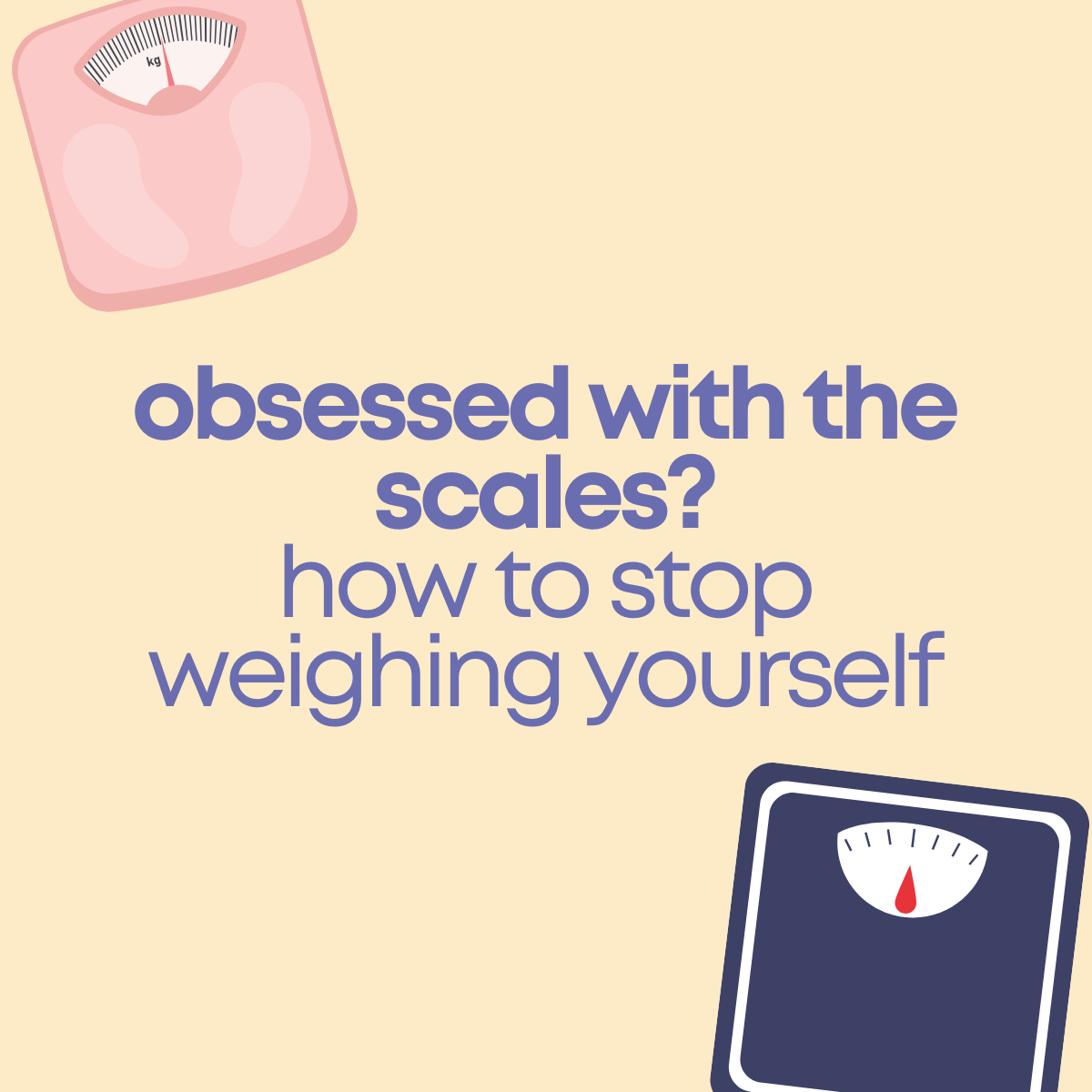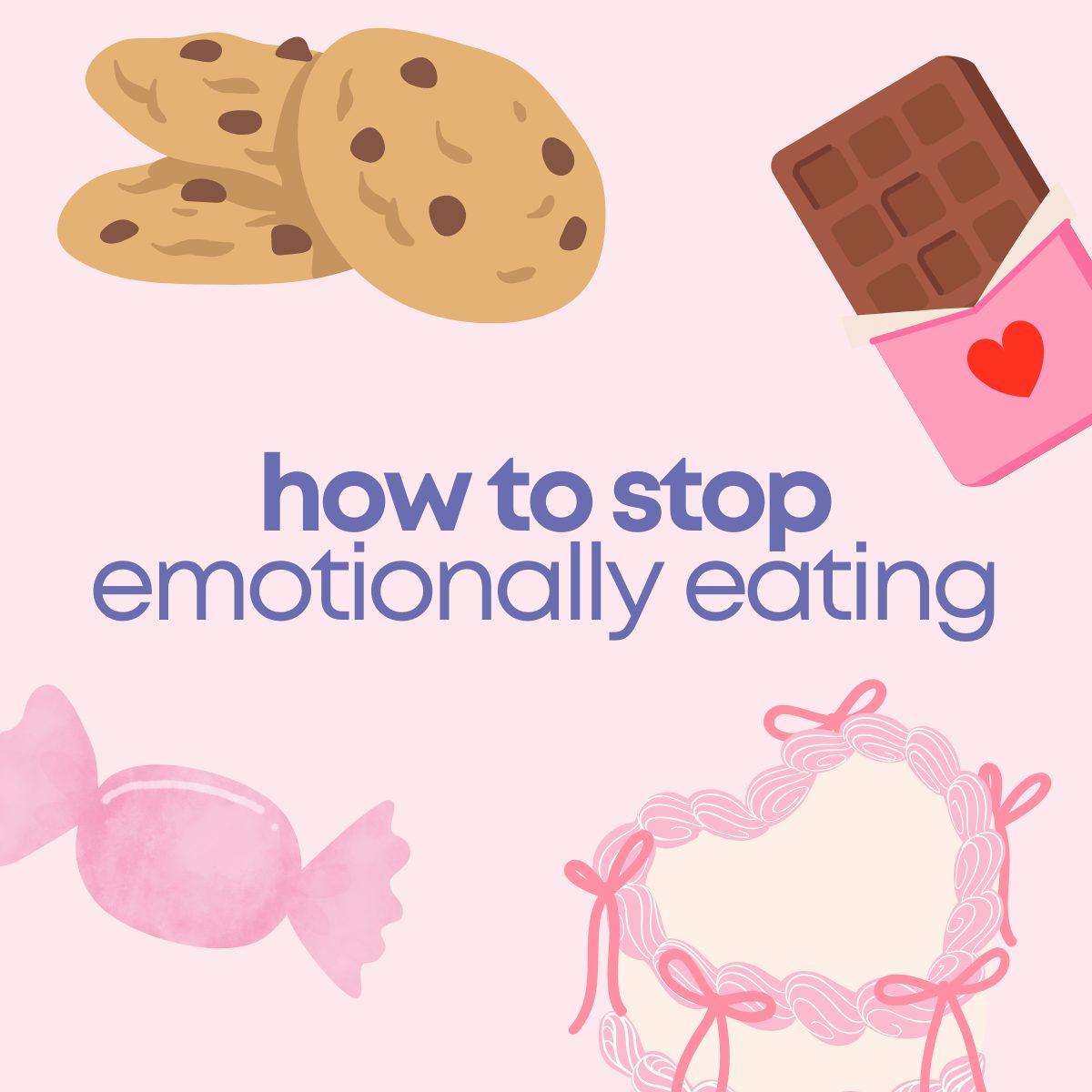It is really hard to stop weighing yourself in a society that places certain body shapes and sizes and other things on a pedestal, and everyone wants to feel a sense belonging and safety.
While it can be really hard to challenge some of these things, it can also be very empowering.
We want to recognise that a lot of the time – weighing ourselves, especially if that’s something you’ve done your whole life often creates a bit of safety and better predictability. Taking that away can create a lot of those feelings of lack of control.
You don’t have to go from weighing yourself every day to never weighing yourself again. It doesn’t have to be that black and white – it’s a journey.
The goal is to move towards weighing ourselves less often and less frequently, as much as possible.
Understanding Your Relationship With The Scales
Here are some useful questions to ask yourself and reflect on to better help you understand your relationship with the scales:
- What is what is your relationship with the scales?
- Do you feel a compulsion? Or do you feel an urge to check the scale frequently?
- Have you noticed any patterns for when it’s happening? For example, a certain time of day? What else is happening?
- Does the number affect how you feel about yourself?
- Does it say something about whether you are ‘passing’ or ‘failing’? Or that you’re ‘good’ or ‘bad’?
- Is it emotionally charged?
- Do any behaviours change based on the number?
- How do you feel before and after you weigh yourself?
- Do you feel any guilt or drive to change your eating or exercise behaviours?
- What are you hoping to get out of weighing yourself?
Common Reasons You May Weigh Yourself
Now you’ve reflected on your relationship with the scales, it’s important to explore the reasons you may choose to weigh yourself.
Some of the common reasons include:
- Feeling guilty about eating or not exercising
- After a binge
- Feeling as though you’ve been really ‘strict’ with your diet this week, and using the scales to seek validation
- It can be a form of body checking
Why Is It Important To Stop Weighing Yourself?
It Can Be Harmful
One of the most important reasons is, in our time, as dietitians, we’ve really seen the harmful impacts of taking a weight-centric approach to health, food, and/or our bodies.
We know statistically, around about 95% of people who lose weight will regain it within five years and 60% gained back more than when they started. And we call this the ‘Nike tick’ effect. And the reason this ‘Nike tick’ effect happens is because our bodies see weight loss or starvation as a threat to survival.
This means the body will put a bunch of things in place and metabolism might slow down, our hunger cues will increase our energy expenditure and activity levels will drop, energy might get lower. This is for the body to regain a sense of safety and balance. That’s why weight loss isn’t as simple as calories in versus calories out, as people like to say on social media.
Scales Fluctuate
A big thing to remember is the numbers on the scales fluctuate so much.
There’s so many different things that can influence what your weight is when you jump on the scale. For example: how much salt you eat, and how much carbohydrates you’ve eaten, are you drinking more water? Or less water? Are you retaining more fluid? Your hormones – is it time for your period? All those things can influence what our number is on the scales.
We want to highlight that we can’t really control that our body does all these different functions every single day.
It Can Be Demotivating
Something else worth mentioning is that the scale when it’s used as a motivating tool, can also be super demotivating around certain health behaviours.
If you’ve decided you want to try and eat lots of fruits and vegetables, and go to the gym in hopes to lose weight. If the scale isn’t changing, even though you’re doing those things, that can be a really demotivating and may cause you to stop engaging in those health behaviours.
It Can Trigger Disordered Eating Behaviours
Disordered eating behaviours can commonly be triggered as a compensation for what we’re seeing on the scales.
Whether that’s restriction or bingeing, or over exercising, all of those can be driven by fact that the scales are motivating, but demotivating at the same time. Meaning – motivating us to be like, ‘Okay, I need to punish myself, I need to do more, I’m not doing enough’. Unfortunately, it can make those desires to engage in those disordered eating behaviours so high.
Weight is Not a Direct Determinant of Health
The idea that weight is not a direct determinant of health is just proven by plenty of research. When we look at our health status, it’s going to mostly be determined by our health behaviours. Some of it we don’t have control over – our genetics, and our environment (access to quality food, financial capacity, ability to engage in health behaviours).
One other thing to note is that with weight-centric research, is that there might be a significant degree of correlation rather than causation. So, people living in larger bodies may have different socio economic status to people living in straight size bodies, access to health care, and other factors of privilege.
This is just why we don’t want to look at BMI as an individual measure of health. There’s just so much more that goes into it.
View this post on Instagram
Practical Strategies To Stop Weighing Yourself
First of all, we just want to acknowledge that it can feel scary. However, the scale is more likely to cause us to feel out of control around food than confident in feeding ourselves intuitively. Here’s a few practical tips on how you can stop weighing yourself.
Consider the Pros and Cons
We encourage you to think about the pros and cons, and try to come back to that as you’re going through this process.
Get Rid Of, Or Hide The Scales
You might not be ready to completely just chuck the scales in the garbage bin, but even just giving it to someone, whether it’s a friend or a family member to look after.
Set a Goal to Reduce Weighing Yourself
If you’re not ready to go cold turkey and get rid of the scales, try setting a goal to reduce it to fewer and fewer amount of times in the week.
For example, twice in a week instead of daily. And then you could just phase it out gradually and then go through those steps of getting rid of it or getting it hidden.
Journal About Your Experience
If you have the urge to weigh yourself, this can be a great journal prompt to explore how you’re feeling. Instead, can you redirect your focus and write down something that you’re grateful for your body for? For example “ I’m really grateful that my legs have allowed me to go for a walk and get coffee”.
Can you reflect on some of your values of why you’re trying not to engage in weighing yourself?
Reach Out For Support
Of course, we recommend working with the psychologist and or dietitian experience in disordered eating and body image concerns.
Reaching out to friends and family that you feel safe with is also a great place to start.
You can also access free resources through the Butterfly Foundation, or if you’re in Queensland, maybe Eating Disorders Queensland as well.
At Imbodi, we also have our podcast, blog and Instagram that you can access for free!
View this post on Instagram
Summary
In this episode we chatted about some questions to help you reflect on your relationship with the scales, understanding why you might weigh yourself at the moment, and explored why it’s important to not obsessively weigh yourself. We then chatted about a few practical strategies on how to stop weighing yourself.
We hope you’ve enjoyed the episode on how to stop weighing yourself! Stay in contact with us on Instagram @imbodihealth, and we’ll see you in the next episode.



Comments +